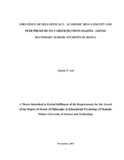Please use this identifier to cite or link to this item:
http://ir-library.mmust.ac.ke:8080/xmlui/handle/123456789/262Full metadata record
| DC Field | Value | Language |
|---|---|---|
| dc.contributor.author | Joel J P, Ogutu | - |
| dc.date.accessioned | 2017-11-15T11:52:59Z | - |
| dc.date.available | 2017-11-15T11:52:59Z | - |
| dc.date.issued | 2017-11 | - |
| dc.identifier.uri | http://r-library.mmust.ac.ke/123456789/262 | - |
| dc.description | THESES | en_US |
| dc.description.abstract | Students in Kenyan secondary schools continue to face pressure on career decision making, despite thegovernment’s emphasis on career guidance and counselingprogramme in schools.Thousands of school-leavers miss out on suitable career choices, because of distorted career choices. More often students make career choices in less regard to ability or talent. Existing reportsreveal that most people are employed in areas thatare neither in line with their professional training nor with their career interests. The purpose of this study was to examine the influence of self-efficacy, academic self-concept and peer pressure on career decision making among public secondary school students. Specifically, the study sought to examine the influence of: self-efficacy, academic self-concept, peer pressure on career decision making among secondary school students. Besides, the study sought to establish the relationship and differences between self-efficacy, academic self-concept and peer pressure on career decision making among secondary school students in Busia County. The study was anchored on Social Cognitive Career and Self-concept theories by Lent, Brown and Hackett, and Donald Super respectively, and conceptual framework. The study adopted correlational and causal comparative research designs. The target population was 6664 form four students, 138 teachers in-charge of career guidance and counselling and 1 County Quality Assurance and Standards Officer. The study employed purposive sampling, stratified random sampling and simple random sampling techniques. The sample size consisted of 393 participants (364 students, 28 teachers’ in-charge of career guidance and counselling, and 1 County Quality Assurance and Standards Officer). Questionnaires, interview guide and document analysis guide were used to collect data from the respondents. Pilot study was carried out to establish the reliability and validity of the research instruments used in data collection. Qualitative data was transcribed and reported according to themes. Quantitative data was analyzed using descriptive statistics including frequency tables, percentages, mean and standard deviation and inferential statistics including Spearman’s correlation, Multinomial logistic regression and Hierarchical multiple regression. Descriptive statistics revealed high mean and low standard deviations in variables influencing career decisions. The results of Spearman’s correlation in objectives one to three showed statistically significant relationship between independent variables and the outcome variable(rs 364) = - 0.236**, p=0.001)for self-efficacy,(rs (364) = -0.208, p= 0.001) for academic self-concept and(rs (364) = 0.165, p=0.001)for peer pressure on career decision makingat α=0.05.Multinomial logistic regression statistical models significantly compared between comparison category relative to referent categoryhigh relative risk ratios.Hierarchical multiple regression analysis revealed that thethree independent variableswere significant, F (1,360) =13.491, p<.05) accounting for 11.5% of the variance in career decision making.Academic self-concept wasthe most important predictor of career decision making accounting for 5% of the variation. It was concluded that self- efficacy, academic self-concept and peer pressure influenced career decision making among secondary school students in Busia County.It was recommended that career guidance teachers in schools and the education office should aim at fostering strong and positive self-efficacy, academic self-concept and peer relationships among students to them over challenges faced in career decision making. It is hoped thateducation officers and career guidance teachers will use these findings to improve on students’ skills in career decision making. | en_US |
| dc.description.sponsorship | SCHOOL OF ARTS AND SOCIAL SCIENCES | en_US |
| dc.publisher | MMUST | en_US |
| dc.subject | Structural Equation Modeling | en_US |
| dc.subject | Peer Pressure Inventory | en_US |
| dc.subject | Academic Self-Concept Scale | en_US |
| dc.subject | Career Decision Scale | en_US |
| dc.subject | Career Guidance | en_US |
| dc.subject | Kenyan secondary schools | en_US |
| dc.subject | career decision making | en_US |
| dc.subject | school-leavers | en_US |
| dc.title | INFLUENCE OF SELF-EFFICACY, ACADEMIC SELF-CONCEPT AND PEER PRESSURE ON CAREER DECISION MAKING AMONG SECONDARY SCHOOL STUDENTS IN KENYA | en_US |
| dc.title.alternative | INFLUENCE OF SELF-EFFICACY, ACADEMIC SELF-CONCEPT AND PEER PRESSURE ON CAREER DECISION MAKING AMONG SECONDARY SCHOOL STUDENTS IN KENYA | en_US |
| Appears in Collections: | School of Arts and Social Sciences | |
Files in This Item:
| File | Description | Size | Format | |
|---|---|---|---|---|
| INFLUENCE OF SELF-EFFICACY, ACADEMIC SELF-CONCEPT AND PEER PRESSURE ON CAREER DECISION MAKING AMONG SECONDARY SCHOOL STUDENTS IN KENYA.pdf | 3.41 MB | Adobe PDF |  View/Open |
Items in DSpace are protected by copyright, with all rights reserved, unless otherwise indicated.
